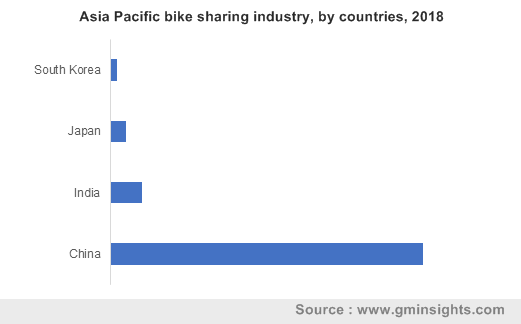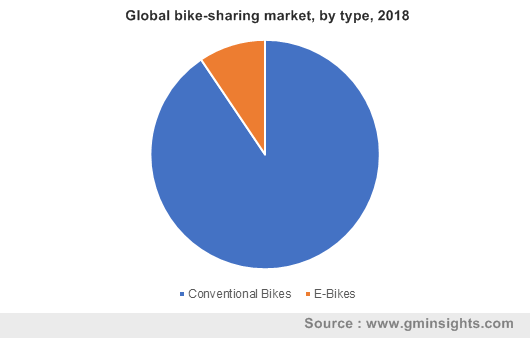Home > Automotive > Automotive Services > Shared Mobility > Bike Sharing Market
Bike Sharing Market Analysis
- Report ID: GMI4302
- Published Date: Aug 2019
- Report Format: PDF
Bike Sharing Market Analysis
The demand for e-bikes is increasing across the globe owing to their fast & flexible operations and zero carbon emissions. The growing consumer inclination toward the usage of e-bikes as cost-effective & eco-friendly transport solution is adding up to bike sharing market expansion. The increasing investments in R&D activities to enhance battery performance and improve bicycling infrastructure are expected to provide lucrative opportunities for the company’s expansion. These cycles are majorly used by commuters for hill climbing and carrying heavy loads, where pedaling manually is a critical task. Bike-sharing service providers in North America and Europe are replacing conventional bikes with e-bikes to offer reliable and efficient performance to their users. For instance, in March 2019, Uber announced the launch of Jump, its e-bike sharing service in London. The company delivered over 350 bikes across the city, which can be located through smartphone applications.
The free-floating model is expected to witness high growth due to its enhanced flexibility, accessibility, and affordability. Service providers are increasingly deploying dock less cycles on the roads to reduce the cost of building large docking stations. The integration of advanced GPS solutions into bikes aid service providers to locate them in any region, eliminating the chances of theft incidents. These cycles are majorly used by commuters to cover large distances, without any parking concerns. Several service providers such as LimeBike and oBike provide credit points to users for returning the bike to a designated parking location. The increasing traffic concerns in urban areas are encouraging commuters to use free-floating options over station based.

Asia Pacific bike sharing market is expected to grow at over 15% CAGR from 2019 to 2025. The industry is witnessing a rapid growth in the region owing to the changing consumer preference toward energy-efficient transport solutions. According to the Ministry of Transport (MoT), China has over 70 bike-sharing companies, with 23 million bicycles & over 400 million users across the region. The increasing urbanization and rapidly growing population in India and China are contributing to industry expansion. Several start-ups are investing in the Chinese market due to the availability of a large number of potential customers in the region. Additionally, around 30 Chinese cities including Shanghai and Beijing have implemented several regulations to guide bike-sharing maintenance, operation & production, enabling service providers to remove damaged bikes from the existing fleet. For instance, in August 2017, China issued a country-wide framework for regulating dock less bike-sharing to ensure even distribution of bikes & designated parking space set-up.
The demand for bike-sharing services is increasing in India due to the rising pollution & noise emission in several cities including Delhi, Mumbai, and Bangalore. The Indian government is developing dedicated bicycle routes to ensure maximum pedestrian and cyclist safety, contributing to industry expansion. The young & geriatric population in the region is increasingly utilizing these services due to their low-cost and easy availability.
The increasing demand for low-cost transportation alternatives in Latin American countries including Brazil and Mexico is expected to provide lucrative opportunities to industry expansion. Companies operating in the region are integrating several advanced technologies into bicycles to deliver efficient user performance. For instance, in February 2018, BKT bicipública (BKT) announced the partnership with Stage Intelligence, a London-based Artificial Intelligence (AI) solution provider. This aided BKT to incorporate AI technologies into its bike-sharing platform to optimize the rider experience.

